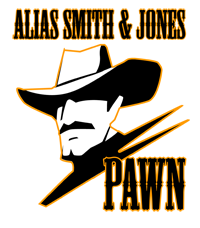Pawn FAQ
What is an extension?
If you are unable to pay back your loan in full on its due date, you may be able to get an extension on your loan. With an extension, you will be required to pay a portion of the interest owed, then you may extend the length of your loan for as many days as needed.
What is a renewal?
If you are unable to pay back your loan in full on its due date, you may get a renewal. With a renewal, you pay the interest that has accrued on your loan in full, and a new loan is written. The principal loan amount remains the same, as does the interest rate, but the due date is reset for the full loan term.
How do you determine the value and condition of the collateral?
We base pawn loan amounts on the value of your item — its current appraised value, its current condition and our ability to sell the item. We use all the research tools we have at our disposal to determine an item’s value and get you the most money we can. The appraisal process varies depending on the type of item. For example, jewelry is evaluated differently than a DVD player which is evaluated differently than a table saw, etc. In addition, items such as gold, coins, and jewelry maintain their value over a reasonable period of time, while items like computers and electronics depreciate much quicker, all of which is taken into account.
The condition of an item is always taken into account during the appraisal process. For example, if two televisions come in and one looks nearly unused and the other has a crack in the side, we will loan more on the TV that’s in better condition. When it’s general merchandise you want to pawn, we test each item to ensure it is in good working condition. This includes, but is not limited to, a visual inspection, plugging an item in and turning it on, and noting if any necessary accessories (such as remote controls) and manuals are included. The better the condition of your item, the more money we can loan you. This is true for any collateral.
How do you determine the value of jewelry, gold and other precious metals?
When jewelry is the collateral we test the precious metals and diamonds to determine its worth. We have a GIA trained diamond grader on staff as well as numerous other employees who have been working with jewelry for many years and are quite knowledgeable. The diamond testing includes a visual inspection using a jeweler’s loupe, weighing the item, sizing (determining carat weight) any stones, and noting the cut/color/clarity of each. Current market values of precious metals will also affect the value.
The price of gold, silver, platinum and other precious metals is based on market values, the price for which is reviewed and updated daily. Prices can vary greatly as the loan amount for 24K gold, for example, is significantly higher than that of 14K gold.
Can you give me a quote over the phone or via email?
Unfortunately, we cannot give quotes over the phone because loan amounts vary greatly depending on the condition of an item. For general merchandise, we test each item to ensure it is in good working condition. The better the condition of your item, the more money we can loan. And for jewelry, we test to ensure diamonds and gold are genuine. Photos via email are also not acceptable ways of describing your item – we will need to see it in person.
Where is the collateral kept while it’s in pawn?
While your item is in pawn, you still own it. When you give us an item for pawn, we keep your merchandise — along with all accessories (remotes, cables, etc.) — in a secure area accessible to authorized employees only where it is safely stored until you come back to pay your loan in full and claim your merchandise. In addition, we are fully insured for the loan value of the collateral we keep.
Still have questions? Feel free to call or stop in to one of our locations, or send us an email. We’ll be happy to answer any additional questions you may have.





Follow Us!